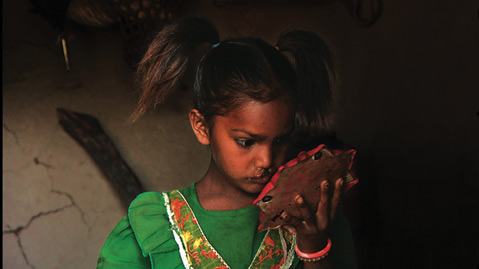Curing the Clefted
Oscar-Winning Smile Pinki Director Megan Mylan on the Power of Documentary

In a type of filmmaking usually compelled by despair, danger, and drama, director Megan Mylan brings an air of levity, happiness, and hope with her documentary Smile Pinki, which follows children with cleft palates and lips on their journey from their villages in rural India to the big city where a free, simple, and short surgery promises to change their lives. In a mere 39 minutes, Smile Pinki reveals how these kids — and often, their families — have become outcasts in their communities due to their very common, one-in-700-births deformity, but then are set back on the track toward normalcy thanks to a nonprofit that performs 3,000 of these surgeries per year in India alone. And it seems that the critics are game for happy doc endings as well, for Mylan — who comes to UCSB’s Campbell Hall on Thursday, April 22 when Smile Pinki shows as part of the fifth annual Human Rights Film Festival — won the short documentary Oscar in 2009 for the film.
“I specifically look for stories where I can find people going through once-in-a-lifetime moments and I can go along for the ride — once the action has passed, it’s not my story,” explained Mylan, who deftly shows every step of the journey, from the villagers learning about the free service and their long ride to the city to the hospital experience and positive repercussions months later. She first learned about the organization from a member of Smile Train, which is the nonprofit that she features. When approached, she assumed they wanted her to make a PSA, and she was not interested. But they assured Mylan that they wanted a strictly journalist take, and gave her total creative control.
Mylan then went to India to investigate and was immediately hooked. “Once you hear about the work they do and how dramatically these children’s lives are changed in a very short surgery, as a storyteller, I got excited about being able to go on that journey,” she explained. The resulting documentary manages to both present a serious issue — there are more than one million in India with cleft palates or lips, and another 35,000 are born each year — and reveal a hopeful future, which typically mournful modern documentaries (at least those usually winning awards and critical praise) often fail to feature. “It was really refreshing to get into a story where I was pretty certain there’d be a happy ending,” said Mylan, whose presentation was also designed to attract more than the regular doc-watcher. “The fact that this film has some levity and that it’s a pretty accessible story that takes places in rural India and is very much a story of a father and daughter, it opens it up to a broader audience who might not be a natural documentary audience.”
The film was a natural fit for Mylan, who started her professional life working for goodwill-aimed nonprofits much like Smile Train. “I started as an activist who became a filmmaker wanting to share those stories about people making a positive impact,” explained the New York City resident. “Now I feel like I wear more of the filmmaker hat than an activist hat, but they tend to get switched on and off.”
In many ways, being a documentarian is simply carrying on such activism, and arguably affects more lives and generates greater support for noble causes than the work of just one activist. Mylan appreciates that connection. “I am an eternal optimist,” she explained. “I deeply believe that the better we know each other, the better this world is. I believe that documentaries have a unique way of doing that, of pulling someone into another world.” No matter how different people are, Mylan said, her documentary and others provide ways to connect, and she hopes that triggers a tangible response. “If they walk out of the theater and my characters are still in your head and in your heart, then I’ve done my job,” she explained. “They’ve become part of your human family. It makes it harder to have ‘the other’ in your life.” And that experience, believes Mylan, “can spark very concrete action in great ways,” whether it’s writng to your elected officials, volunteering your time, or donating money. “I love making that sort of thing happen,” she said.
After watching Smile Pinki, odds are it will happen to you too.
4•1•1
Smile Pinki screens along with A Blooming Business and The Greatest Silence: Rap in the Congo on April 22 as part of the Human Rights Film Festival, which takes place throughout April at UCSB’s Campbell Hall. Evening passes are $10 general, $8 students, and a full pass is $20 general, $16 for students. Call 893-3535 or visit artsandlectures.sa.ucsb.edu.



